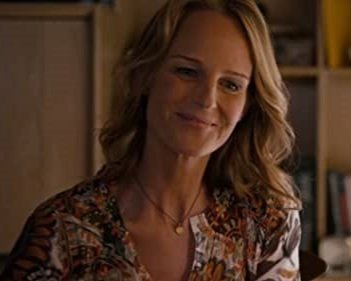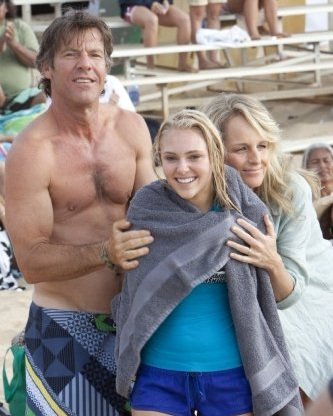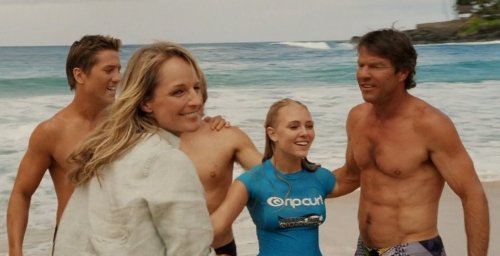Helen Hunt Filmography Part 19: Disability and Religion
It’s hard to imagine two movies with similar themes being more different.
In 2011 and 2012 Helen Hunt had two movies released that dealt with disability from a religious point of view.
Soul Surfer (2011) is an Evangelical favorite. It’s the triumphant story of Bethany Hamilton, a competitive teen surfer who loses her left arm to a shark bite. She believes all things are possible with God and overcomes great odds to return and dominate her sport.
This is one of the highest rated films on ChristianBook, a resource for conservative, evangelical materials including Bibles, books, Bible studies, and homeschool materials.
The Sessions (2012) is the story of a man paralyzed by polio as a child who hires a sex surrogate to help him have a sexual experience. It is rated R and receives a "Severe” rating for Sex and Nudity on iMDB’s Parent Guide.
The film explores Mark’s sexuality through conversations with his Catholic priest and Jewish sex surrogate.
In other words, you could not make a more un-evangelical movie if you tried–unless Mark was also gay.
I cannot think of two movies that take the same theme—God’s presence in disability—that are more dissimilar or that have absolutely opposite target audiences.
I find this juxtaposition absolutely hilarious.
I had a lot of questions while watching Soul Surfer.
What in the world is Carrie Underwood doing in this? As in why is she in this? And once she is in it, what is she doing? I’m usually neutral on Carrie Underwood, but I’m not neutral on her performance in this movie. Her acting is bad, like who-did-she-pay-to-get-this-role bad.
Why does Dennis Quaid look like he’s never opened a Bible in his life?
Why does the Bible he’s reading look like it’s never been opened?
Why is everyone so upbeat and positive? Why does no one really acknowledge the pretty serious trauma of the accident? Why do they just slap some Bible verses on it and move on to the next super positive experience?
Actually I know the answer to this one.
Having grown up in and spent most of my adult life in American evangelical spaces, I can say they do not handle grief or trauma or hardship very well. There is a lot of suppression and forced positivity in these religious circles, so that part of the film felt very accurate, but also very problematic.
Helen Hunt, as Bethany’s mom Cheri, the only one trying to bring some “It’s okay to not be okay” sanity to this movie It’s a story about a girl who loses her arm to a shark, but she and everyone around her barely processes that loss before diving right back into acting like everything is totally normal.
But seriously, why is there no therapy in this movie? Not even occupational therapy. No rehabilitation therapy. She just starts cutting grapefruit on the floor with her feet.
Also when did Evangelicals become okay with bikinis? This is absolutely not my experience.
Why did they bother casting a total MILF and DILF and then give them the most platonic relationship on film?
And why are Dennis Quaid’s trunks so aggressively low?
The movie presents a fairly standard variation of prosperity gospel theology. If you believe enough, all your problems will disappear. You can still live all your dreams, suffering is a pause, not a stop. It is a detour, not a new direction.
There’s not a lot of nuance or emotional depth to the question of how to suffer.
Overall Soul Surfer is a fine, Hallmarky, family movie. If you’re not an exvangelical, you probably won’t even notice most of the triggering aspects. You can watch this like a normal person and enjoy an uplifting story about a teenage girl overcoming incredible adversity.
To you I say, god bless.
The Sessions joins Mark O’Brien (John Fawlkes) on his journey to see where his sexuality fits in with his disability and his sincere Catholic faith.
With the companionship of his priest Father Brendan (William H. Macy) and his sex surrogate Cheryl Cohen-Greene (Helen Hunt), Mark begins to integrate his humanity and spirituality with his sexuality. Mark brings a full range of emotions—including humor and rage and desire—to the experience of God.
The discussions between Mark and his priest bring up historic Christian traditions and attitudes towards sex. Seeing a sex surrogate doesn’t fall under sanctioned sexual activity and creates some tension for both of them.
Father Brendan realizes that the standard answers are not easy or adequate. He chooses to love Mark and support his journey toward wholeness, despite the unconventional methods. I loved the portrayal of the priest as companion and fellow learner in Mark’s journey, rather than as authoritative director.
With Cheryl, Mark learns to enjoy his body in a way that he hasn’t since he was six years old. She sees his body as beautiful and worthy of love. She helps him overcome his feelings of guilt. She helps him understand the polio was not his fault; God was not punishing him for anything.
The uniqueness of Christianity is not its morality, but it’s embodiment. The miracle is that God became a full human being. Often this distinctive aspect of Christianity is ignored, but the most Christian act is to live fully in one’s body as good and whole. To find peace in living fully human with the divine.
I would have liked to see more of the intersection of Cheryl’s work and marriage and family.
At the beginning of the movie, Cheryl’s husband seems supportive of her work, but later he seems jealous, and there isn’t a lot of development as to why his attitude changes. Believe me, I don’t want the movie to be about Cheryl’s husband. But if her work creates tensions at home, I would be interested in exploring that.
I also worried the whole time that Cheryl’s teenage son was going to get into her locked desk drawer where she stores her session notes. It’s not clear how much he knows about what she does. I think that it would be interesting to know what she shares with him, how she talks to him about what she does, and how her work affects her parenting.
To me Soul Surfer is unremarkable and forgettable.
Helen Hunt earned a Best Supporting Actress nomination for her role, and I think what she does is remarkable. I know The Sessions won’t be for everyone, but I loved the interesting and nuanced look at suffering and sexuality. I thought the role of religion was healthy and unconventional.









